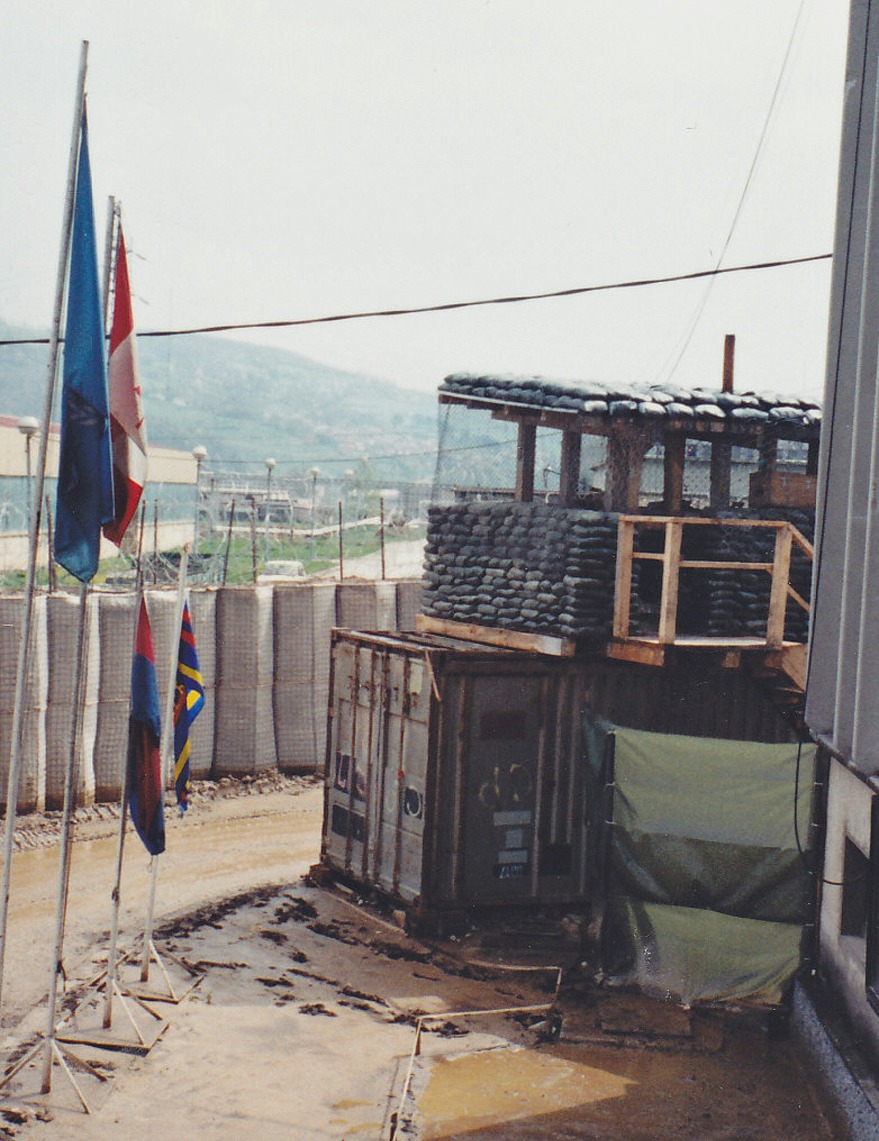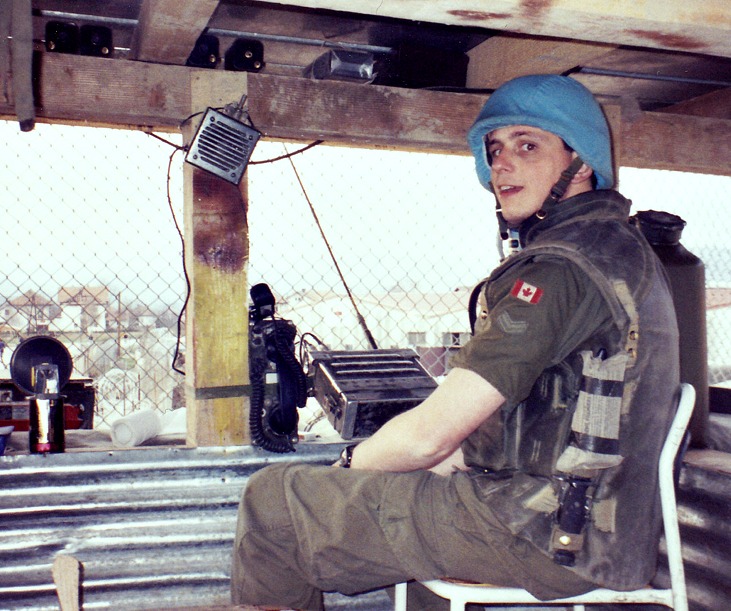I served as a United Nations peacekeeper in Visoko, Bosnia from October, 1993 to April, 1994. My job was in administration, but as anyone in the military will tell you, you are a soldier first and a tradesman second. For me, that meant army stuff came before the paperwork so if they needed extra hands to man the sentry bunkers that surrounded our camp, for example, I could be pulled from my job for guard duty.
One evening, in March, 1994, I was assigned to the bunker called Op Delta. It was a wooden hut with just enough room for two people and usually contained a radio, water, some food, a seat and a small metal garbage can. To give us a good view of the surrounding area, it sat on top of a sea container and looked similar to this one:

The guard duty assignment came to me with only a few minutes notice, so I had to leave work, inhale dinner, grab my rifle, helmet and flak vest and get out to the bunker to start my four to midnight shift. Inside Delta, I met Corporal Massincotte, a young French reservist from Trois-Rivières.

One of our jobs, besides maintaining the security of our camp, was to report so-called ceasefire violations. That included any small arms, mortar or artillery fire that we could see from our perch. As Massincotte gave me a briefing on reporting these violations, I developed a serious case of the hiccups.
Now, when I usually got the hiccups, it wasn’t just a little “hic” that I could swallow quitely. My hiccups were a combination of a high-pitched regular hiccup and a burp. They were loud, impossible to hide and erupted every fifteen seconds or so. And they would go on forever.
I blamed the quick dinner.
It didn’t take long for Massincotte to become annoyed. He insisted that we try remedies that I knew would never work. I drank water three different ways, held my breath till I was a shade darker than my helmet and even tried jumping jacks. I drew the line at standing on my head. As expected, nothing worked.
Then a distant rumble interrupted our hiccup-curing experiments. I picked up the binoculars and scanned the horizon just as a pillar of dust and debris rose up behind a house about two kilometres away. Massincotte reported the ceasefire violation on the radio and I watched for more, working to steady the binoculars against my incessant hiccups.
Another mortar struck a road about a kilometre away. I kept the binoculars tight to my face, watching the area. People ran inside, cars drove away. The neighbourhood became very quiet. Then a third and fourth mortar exploded on the road. A fifth and sixth followed in quick succession, each one coming closer to the camp. Massincotte made his report.
I leaned forward and propped my elbows on the ledge, trying to keep the binoculars level as I scanned the road and houses looking for the next impact. The only sounds were Massincotte’s words and my hiccups. When he finished his report, I didn’t hear him step back from the radio where he waited for my next hiccup then plowed his combat boot into the small steel garbage can.
I haven’t had the hiccups since.
🙂
L O L!!
Too funny Lesleyanne!
I wanted to ask a question if you would not mind answering. What do you think the average Bosnian citizen thinks of UN peacekeepers that were stations in Bosnia during the war? Just out of curiosity. I’m from Bosnia, specifically Zenica which is not far from Visoko. Besides minor contact with UN peacekeepers when I was younger, I never really had a chance to talk to one in my adulthood.
Hello. That’s a good question. Last year I went to Croatia and asked that of my tour guide and his feeling is that overall sentiment can vary from area to area and depended on the individual. Some are indifferent, some still hold a grudge. And I can’t blame them but I hope they’ll look at us as individuals rather then as representative of the United Nations. As individuals, we wanted to help, but were so often frustrated by the politics of everything going on. I think it was a big learning experience for the UN. The book I wrote on Srebrenica is my attempt to give back a little by trying to educate the North American audience about Srebrenica and the war overall.
I do know Zenica. Two guys from my unit died in an accident on the bridge there in Nov, 93. And a truck I was in accidentally struck a little boy on Jan 24, 94. He was very lucky and came away with only a broken leg. I’ve always wondered how he fared after.
That’s interesting and thank you for taking the time to reply. I suppose it is the politics of the whole situation that are to blame. I would hope that Bosnia would be a learning experience not just for the UN but for the whole world. Sadly, it appears that is not the case. As for Zenica, it is known for its large number of children that were victims of the war. In fact, the first civilian to die in Bosnia was a 2 year old girl that was shot in the arms of her mother not far from an army base.
On a lighter note, I’m definitely going to take the time to order your book and read it soon.
Yes, I’d heard of little girl years ago. Maddening. Sometimes I think the best solution would be to put the leaders on front line anytime they want to go to war. Wouldn’t take long for them to change their minds.
If you do get the opportunity to read the book, I’d really like to hear what you think. 🙂
Great story, Lesleyanne. 🙂
Glad you liked it. It’s a cure I don’t recommend for people with weak hearts. 😀
Hey, was in the camp in Visoko for the last two months of my tour Oct 93 to April 94. Started in Croatia, then Macedonia, then Visoko for the last two months. Looks like we were there at the same time. Good story.